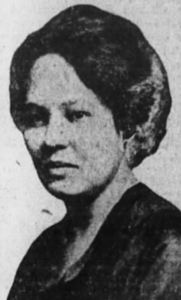
Cencelia
*This date in 1883 is celebrated as the birth date of Cecelia Cabaniss-Saunders, a Black educator and administrator.
From Charleston, South Carolina, Cecelia Hayne Holloway's father, James H. Holloway, was a school principal during American Reconstruction. Cecelia Holloway graduated from Fisk University in 1909. She then attended Tuskegee Institute, receiving her Master of Social Science. Cecelia continued her studies at Columbia University, New School for Social Research, Swarthmore, Wellesley, and the University of Madrid.
After teaching at South Carolina State University, Cecelia assumed the challenge of the National Board of the Young Women's Christian Association before she married Dr. James E. Cabaniss in 1912. Soon widowed, then remarried in 1915 to John D. Saunders, a New York Realtor. However, she would carry the Cabaniss name for the remainder of her life, known to all as Cecelia Cabaniss-Saunders.
Over the years, Cabaniss Saunders distinguished herself professionally, adding luster to her family and the Cabaniss name. Soon, she became Executive Director of the Upper Manhattan (Harlem) YWCA, a position she held for over thirty years. While director, she raised funds needed to expand the Y from a simple residence on 132nd Street to a million-dollar plant on 137th Street between 7th and Lenox Avenues. However, her most valuable contribution "was helping human beings by building an organization where untrained Negro women could gain professional training and experience..."
As director of the YWCA, Saunders testified to conditions in Harlem, especially for women, at various hearings and before multiple commissions. In 1935, she spoke to the mayor's Commission on Conditions in Harlem about women's work experiences with racial discrimination. 1939, Saunders was part of the Committee on Street Corner Markets work. She was also a speaker at YWCAs and YMCAs in other cities. 1939, the Tuskegee Institute recognized her work with an honorary Master of Science degree.
The New York Age said of Saunders' career and impact, "When a proper history of the development of Harlem from 1914 to 1947 is written, Cecilia Cabaniss Saunders will have star billing." Her work was important to the move towards racial integration in the YWCA system in 1946. Cecelia Saunders died in 1966 at the age of 86.